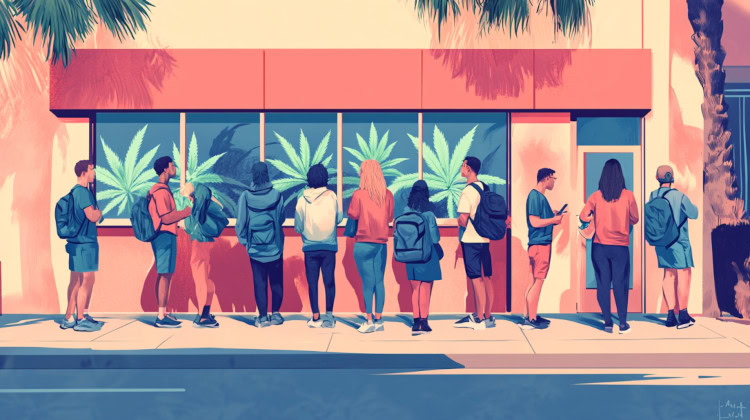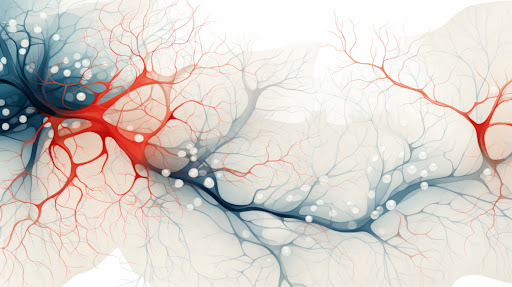Patients in states where both medical and recreational cannabis are legal filled fewer prescriptions for medications frequently used to treat anxiety, according to the results of a recent study.
The study was completed by a team of researchers including Ashley Bradford, an applied policy researcher who studies the economics of risky behaviors and substance use within the United States. In a research brief written by Bradford, she notes that the team wanted to learn how different cannabis laws and the opening of regulated cannabis dispensaries affect the rate at which patients with private medical insurance fill prescriptions for anti-anxiety medications and other drugs.
The medications involved in the study include benzodiazepines, a class of drugs that induce a calming effect by increasing levels of the neurotransmitter gamma-aminobutyric acid, or GABA. Drugs in the class include Valium, Xanax, Ativan, and others. The study also involved drugs that address psychosis in various ways, known as antipsychotics, and antidepressants, which relieve symptoms of depression by affecting neurotransmitters such as serotonin, norepinephrine, and dopamine.
Researchers also analyzed prescriptions for a class of sedatives known as barbituates and sleep medications known as Z-drugs, both of which are used to treat insomnia. However, the study did not attempt to estimate the policy implications of these medications.
Study Used Data From More Than 9 Million Patients
The researchers analyzed prescription data for more than 9,000,000 patients with private insurance over 14 years and used a synthetic control method to examine the association of cannabis policies with prescribing.
The researchers found “consistent evidence that increased marijuana access is associated with reductions in benzodiazepine prescription fills,” Bradford wrote.
“‘Fills’ refer to the number of prescriptions being picked up by patients, rather than the number of prescriptions doctors write,” she explained. “This is based on calculating the rate of individual patients who filled a prescription in a state, the average days of supply per prescription fill, and average prescription fills per patient.”
“Notably, we found that not all state policies led to similar changes in prescription fill patterns,” Bradford added.
The research brief notes that nearly 23% of U.S. adults reported having a diagnosable mental health condition in 2021. However, only 65.4% reported receiving treatment in the past year, leaving more than a third of affected adults untreated. This lack of treatment can exacerbate the severity of current mental health conditions and lead to an increased risk of additional chronic conditions.
Cannabis As An Alternative to Pharmaceuticals
Access to cannabis offers an alternative treatment to commonly used pharmaceuticals that some patients may find easier to access than other drugs. Many states that have legalized medical cannabis have approved mental health conditions such as post-traumatic stress disorder as qualifying conditions, while states that have legalized recreational cannabis have opened access to all adults.
“Our findings have important implications for insurance systems, prescribers, policymakers, and patients. Benzodiazepine use, like opioid use, can be dangerous for patients, especially when the two classes of drugs are used together,” Bradford wrote. “Given the high level of opioid poisonings that also involve benzodiazepines – in 2020, they made up 14% of total opioid overdose deaths – our findings offer insights into potential substitution with marijuana for medications where misuse is plausible.”
Previous research indicates that cannabis may have an anti-anxiety effect, although more study is needed. Bradford notes that using cannabis instead of benzodiazepines, which have significant negative side effects, may improve patient outcomes.
“This finding is critical given that about 5 percent of the U.S. population is prescribed benzodiazepines,” the researcher wrote. “Substituting marijuana has the potential to result in fewer negative side effects nationwide, but it’s not yet clear if marijuana will be equally effective at treating anxiety.”
The researchers also found that overall, access to medical cannabis led to an increase in prescription fills for antidepressants and antipsychotics. However, some states saw decreases in prescription fills for these drugs.
“There is a lot of variation in the details of state marijuana laws, and it’s possible that some of those details are leading to these meaningful differences in outcomes,” Bedford wrote. “I believe this difference in outcomes from state to state is an important finding for policymakers who may want to tailor their laws toward specific goals.”
Learn about medical cannabis for anxiety. And sign up for NuggMD's Weekly Sesh newsletter for the latest cannabis news, consumer tips, and recommendations.
The information in this article and any included images or charts are for educational purposes only. This information is neither a substitute for, nor does it replace, professional legal advice or medical advice, diagnosis, or treatment. If you have any concerns or questions about laws, regulations, or your health, you should always consult with an attorney, physician or other licensed professional.



